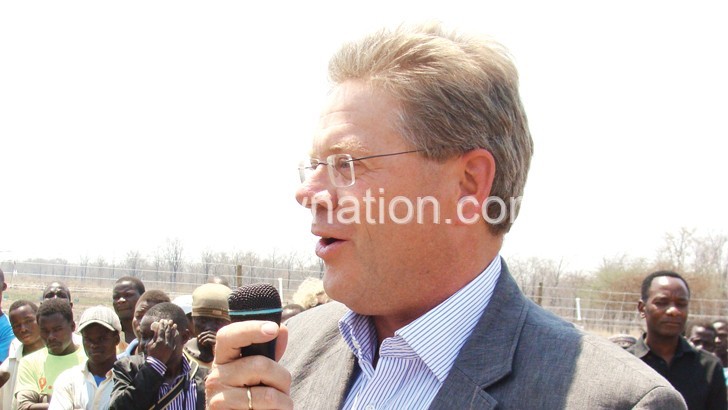Security fears over K557 billion audit
Donors backing the forensic audit into the feared mismanagement of K557 billion (about $883million) taxpayers money between 2009 and 2013 want the probe done under a backdrop of heightened security and secrecy to prevent compromising investigations, Nation on Sunday can reveal.
Sources around the investigation into the alleged plunder of government money, which is backed by Germany, United Kingdom, Norway, Ireland and The European (EU), say the increased security follows the break in and theft of documents related to the investigation at a house of a GIZ official in Lilongwe earlier this year.

supporting the probe
According to sources, the nation will remain in the dark on many aspects of the audit, including dates of arrival of the auditors, when the audit will start and its progress, until the exercise is completed.
GIZ—Germany development arm—is providing technical support to the audit and Katrin Pfeiffer, Deputy Head of Mission and Head of Development Cooperation at German Embassy in Lilongwe, confirmed in an e-mailed response the security concerns and measures.
“With a view to ensuring security of the investigations, we rely on everyone, including the government and the media, not to make public any information about the audit team’s work and schedule. Confidentiality would serve a speedy, undisturbed and efficient review.
“Upon completion, it will be for the Auditor General to decide how to take forward action on the audit’s findings, including communicating them to the public and Parliament in line with the Public Audit Act,” wrote Pfeiffer.
The burglary at the Area 43 residence of the official nearly sparked diplomatic tension between Lilongwe and Berlin after Germany strongly condemned what it perceived as a politically connected attack.
However, Pfeifer said in the statement, the embassy was impressed by the commitment by Malawi Government to ensure a credible audit.
“Development partners [EU Delegation, Germany, Ireland, Norway, United Kingdom] welcome the Malawi Government’s commitment to undertaking a forensic audit of the use of Malawi’s public finances during the current and the two previous administrations (2009 – 2014).”
She explained that the audit was necessary following Price Waterhouse Coopers (PWC) ’s data analysis of Malawi’s financial management system from 2009-2014 which identified significant discrepancies between payments made from government bank accounts and the records held in Malawi’s public financial management system (Ifmis).
“It matched statements from government bank accounts with entries in Ifmis. The analysis showed that 43 percent of payments reflected in the government bank statements were not accounted for in Ifmis. These discrepancies suggest serious weaknesses in the implementation of the public financial management system, which require further investigation.
“The work undertaken by PWC on behalf of the NAO (National Audit Office) did not establish the exact amounts or causes of the discrepancies, nor whether any funds were misappropriated. As communicated by the NAO (press release), this data analysis is being followed up by a forensic audit. This is required to explain the discrepancies or establish if there was any theft of public funds,” she added.
She further clarified that while the audit was being supported by the consortium of development partners (EU Delegation, Germany, Ireland, Norway and United Kingdom) which is assisting Malawi Government in its public finance management reform efforts, NAO remains the leading agency.
NAO spokesperson Lawrence Chinkhunda in an e-mailed response stated the Auditor General, as stipulated in Section 10 of the Public Audit Act, will remain in charge of the audit and eventually report the findings.
“Section 10 mandates the Auditor General as he thinks fit, to contract out to any other person or organisation of established competence and reputation any of his activities under the Act and this includes audits of a specialised nature that require special expertise. This does not exonerate the National Audit Office or Auditor General of its or his responsibilities. As such, the National Audit Office remains in charge of the audit by leading and managing the whole audit process and is responsible for reporting to Parliament in line with the Public Audit Act,” said Chinkhunda.
On the heightened security, the NAO spokesperson said it was imperative that the audit be undertaken without any interference.
Added Chinkhunda: “You can agree with us that our audits add value to the welfare of the citizenry and to the development of the country as we provide assurance as to whether public resources have been used on purposes intended and with due regard to economy, efficiency and effectiveness. As such, it is everyone’s responsibility to ensure that any audit is undertaken free from interference so that we achieve its goals.”
Reacting to the development, governance expert Henry Chingaipe said while the measures taken to the audit exercise alone might not be signs of erosion of trust between government and donors, long term relationship remains strained.
“We have seen for a long time several donors making unilateral or bilateral decisions such as suspending support because of lost of confidence in the management systems in government. The issue of trust cannot be seen along the task of forensic audit alone, it’s a bigger problem. There have been progressive lost of trust for a number of years,” said Chingaipe.
Following the attack at the GIZ official’s residence, German Ambassador Peter Woeste feared the break in was aimed at seeking documents for the audit, but said those behind it must have been disappointed that they found no information apart from the one in public domain.
“We consider this work-related; the expert is working on the financial management system reforms. He had contact with the people who did the audit, well; the thieves should be disappointed because we have no information apart from what is available on the internet,” Woeste told Nation on Sunday then.
President Peter Mutharika and Finance, Economic Planning and Development Minister Goodall Gondwe have on several occasions expressed Malawi’s commitment to an impartial audit.
The audit comes amid waning confidence in the public finance management system by donors following Cashgate in 2013 that saw over K24 billion taxpayer funds stolen in the six months period under audit. n






Why do donors bother to investigate or audit when it yields nothing in the end and the same donors just pump in more aid instead. How many of this sort have been carried out and what have we heard as the outcome….more donor aid? It has become apparent now that all donor money is always mismanaged no matter what.